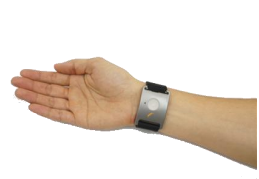Time as a black hole
Psychophysiological Effects of Email Unresponsiveness
Louise Hviid The New School for Social Research, New York
AbstracT
This study explored the physiological impact of the 'black hole' effect, an absence of or failure to respond to an email within an awaited period of time, and found a significant difference in skin conductance, reflecting a heightened arousal. Individuals were equally stressed by not getting vs. not giving a response to someone else, indicating that asynchronous email communication can cause heightened arousal and stress to both parties.
Introduction
Email has become an important means of communication. And yet as a medium of interaction it is characterized by being asynchronous and lacking a sense of 'real time'. An important feature of this asynchronous communication is that it allows for a 'black hole' effect, where the absence of response within an awaited period of time leads to experiences of anxiety and insecurity about the communication sent out (Suler, 1998).
theory
The 'black hole' effect in email communication has been termed the ultimate 'blank screen' with the inherent ambiguity surrounding a no-reply situation, in which we project our own expectations, emotions, and anxieties onto the other (Sulur, 1998). One might expect it to be more stressful to not receive a response, because not giving a response is not inherently ambiguous for the sender.
theory
However, if a 'black hole' effect in email communication is seen as an act of ostracism, intentionally neglecting and rejecting another, research has shown that both parties are affected. With the ostracizer being stressed by performing the act of exclusion (Legate, 2013; Nezlek, 2015). However, little is known about the deeper effects of the 'black hole' experience.
(continued)
Questions
Does the 'black hole' significantly increase arousal levels of the sympathetic nervous system above a baseline (established during cognitive problem-solving)?
Does the 'black hole' affect the arousal level of both the sender and receiver?
Does the level of arousal in the sender or receiver depend on the increase in arousal seen between the baseline and the email response manipulation?
Method
Sixty-eight participants completed the study of which eighteen were males and fifty-two were females (age: M=23.68, SD=6.60). Participants (n=49) had skin conductance measures without sensor error and were used for further analysis.
PARTICIPANTS
Method
The participants wore an Affectiva Q sensor (Affectiva, 2013), a wireless sensor collecting skin conductance data in real time, attached to their non-dominant wrist.
Apparatus

From: Gay et. al, 2003
Design
Baseline Condition (n=49) 3 Minutes of solving a "brain teaser"
Condition 1
Disconnected email: Unable to communicate with others and provide response in timely manner
Condition 2
No Reply: Sending an email but not receiving a replyResults
Because the skin conduction data was negatively skewed, a log transformation was applied before analysis. The log-transferred data was normally distributed. A repeated measures ANOVA with between-subject factors was conducted to compare the effect of perceived non-responsiveness on skin conductance compared to cognitive problem-solving baseline (within-subject analysis).
Results
There was a significant effect of the email non-responsiveness, participants were significantly more stressed (M=0.12)(=higher sympathetic activation) than baseline(M=0.06)when confronted with the email manipulation, F (1,47) = 24.65, p <0.0001, Cohen's d=.736.
(continued)
Results
A between-subjects ANOVA was conducted to compare the experience of stress (=higher sympathetic activation) in 'not giving a response' vs 'not getting a response' manipulations. There was not a significant effect of manipulation type on the skin conductance, F(1,47) = 0.42, p=0.52. Additionally, there was no significant interaction between arousal in the two response manipulations and the arousal between the baseline and the email response, F(1,47) = 0.26, p=0.61.
(continued)
Discussion
The psychological stress resulting from a 'black hole' is possibly better understood as a perceived ostracization. It has been suggested that humans are hard-wired to react negatively to ostracism (Wesselmann, Bagg, & Williams, 2009). If this hardwiring is mirrored in online interactions, the psychological harm would be magnified due to the prevalence of daily email communication. While it is perhaps easier to ignore an email in the inbox than a person physically in front of us, the act of ignoring is likely equally detrimental to our health.
The end.
If you have questions or comments, please email me
[hviil297@newschool.edu],
I will respond.
